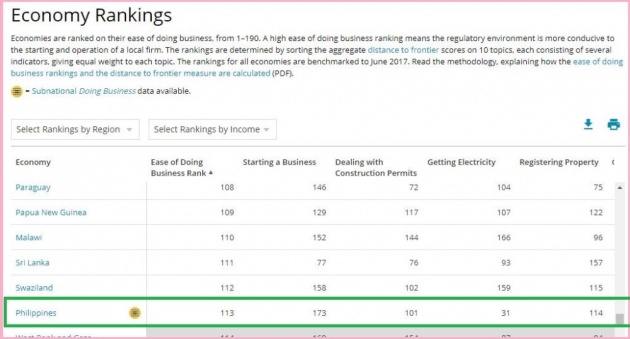Video Credits: NCC via Youtube

Image Credits: Sharon Lopez via Bitlanders
One of the factors that may hinder the economic development in a certain community is the difficulty of obtaining the necessary business permits and licenses. When a certain local government unit does not have a systematic process in securing the above-mentioned documents, it has the tendency that processing time takes longer than usual. This situation could affect the small business owners the most. For this reason, many small business owners and entrepreneurs lose interest in starting up their business in a certain place.
In the 2017 Ease of Doing Business report released by The World Bank Group, it shows that the Philippines ranked 113th out of 190 countries. It was a 14-point drop from the previous year's ranking of 99th.

Image Credits: Sharon Lopez via Bitlanders
The Ease of Doing Business is an index published by World Bank Group to measure the effectiveness of the business regulations in a certain country.
The main goal is to provide an objective basis for understanding and improving the regulatory environment for business around the world
Source: DoingBusines.Org
Here is the comparative ranking of the Philippines from 2008, after the implementation of the ARTA law up to 2017. The graph shows that from rank 141 in 2008, the country has reached the highest ranking of 97th in 2014 and on the 99th rank in 2015 and 2016. However, the rank went down by 14 points in 2017.

Image Credits: TradingEconomics.com
Following the release of the 2017 Ease of Doing Business report, Republic of the Philippines President Rodrigo R. Duterte signed Republic Act No. 11032 or The Act of Doing Business and Efficient Delivery of Government Services. This is an amendment to RA 9485 otherwise known as the Anti-Red Tape Act of 2007. The act aims to facilitate the business processing in the local government units (LGUs) by decreasing the number of signatories and the processing time. Thus, more individuals will be encouraged to open up a business in their respective places.
The amendments made are more on the processes involved which are usually done in every LGU which may include cities and municipalities.
The Effect of Having a Systematic in the Process of Development

Image Credits: Geralt via Pixabay
The development phase may be dependent on several factors such as the geographical location, number of population, the beliefs, and values of the people and the government regulations in general. Before we could start our business activities, it is imperative that we secure the necessary permits and licenses for our business. The requirements vary depending on the type of business we want to pursue.
In the Philippines, there are currently 1,489 municipalities which comprise the whole archipelago of the country. 322 are considered First class municipalities. There are One Hundred Forty-Five (145) cities in the country. Thirty-three (33) of which as Highly-Urbanized Cities, five (5) are independent and the rest are component cities of their provinces.

Image Credits: Geralt via Pixabay
In the old days, the process of securing necessary permits and licenses would usually take several days which would discourage small business owners. The presence of fixers is also rampant which causes additional burden to the people in the locality. With the implementation of the Anti-Red Tape Act of 2007, the people became aware of the processes. Thus, transactions become simpler and faster. However, there are certain provisions which needed to be amended in order to fully serve the people. Thus, the Eases of Doing Business law has been approved.
Is your place implementing the Ease of Doing Business Law?
What Should You Expect?
If you are planning to open up a business enterprise in your place, these are the things you need to look for when visiting our concerned local government offices.
Presence of a Citizen's Charter
Image Credits: BukidnonOnline.com
It is an information showing the updated services being offered by the respective government offices and local government units that must be visible to the public upon entry to the main building of the concerned offices. It can be printed in the bulletin board, tarpaulin and must be visible in the government websites owned by each agency or LGU.
The Citizen's Charter should include
(1) A comprehensive and uniform checklist of the requirements for each type of application or request.
(2) The procedure that the client must undergo
(3) The personnel or office responsible for every step
(4) The maximum time required to finish each process
(5) The required documents
(6) The amount of fees, if there is any
(7) The procedure for filing complaints
The Signatories

Image Credits: Free Photos via Pixabay
According to Section 9 of the RA 11032, the signatories of the documents should be limited to a maximum of 3. The head of the office should also designate an alternate and the use of electronic signatures with adequates security may be used in case of official leave or official business of the official signatory.
Adoption of Working Schedules
The "no-lunch break policy" shall be continuously adopted in order to serve the clients even during lunch breaks and after office hours if necessary.
Identification Card

Image Credits: janjf93 via Pixabay
All employees and personnel are required to have a valid identification which should be worn at all times.
Presence of Public Assistance Desk

Image Credits: mohamed_hassan via Pixabay
Every office is required to have a Public Assistance Desk with a presence of a designated personnel to assist clients who may be needing additional help.
One of the major changes made in RA 9485 (ARTA) was the lowering of the number of days involved in the processing of transactions. Amendments were stated in RA 11032 as follows:
All applications or request shall be acted by the officer or employee within the prescribed processing time indicated in the Citizen's Charter which shall not be longer than 3 working days in the case of simple transactions and 7 working days in case of complex transactions from the date of the request or complete application has been received.
It was amended from the original 5 days for simple transactions and 10 days for complex transactions.
The government is establishing a more organized and systematic policy in order to achieve a progressive country. With the help of the new law, it would encourage more investors and small business owners to start doing business in their own locality.

Image Credits: Tumiso via Pixabay
Here is another video showing the ease of doing business report. Thank you for watching!
Video Credits: Volatilian via YouTube
Thank you, everyone, for reading this blog post. Have a wonderful day.
Meanwhile, please take time to answer the Querlo Chat Survey below:
DISCLAIMER: The views and opinions expressed in this blog post are that of the author and does not in any way represent the agency or department she currently belongs.
ADDITIONAL NOTE: The sites mentioned in this post are for information purposes only and links are provided for easy access. The author does not receive any remuneration from the said companies or sites.
______________________________________________________________________________
Written for Bitlanders
by Sharon Lopez
Date: July 18, 2018
Visit my blog profile for more BLOG POSTS
Let's connect on Facebook
Want to earn from sharing your opinions through blogging? Join us in Bitlanders and claim your 1 DOLLAR REWARD upon signing up. CLICK HERE TO JOIN.



